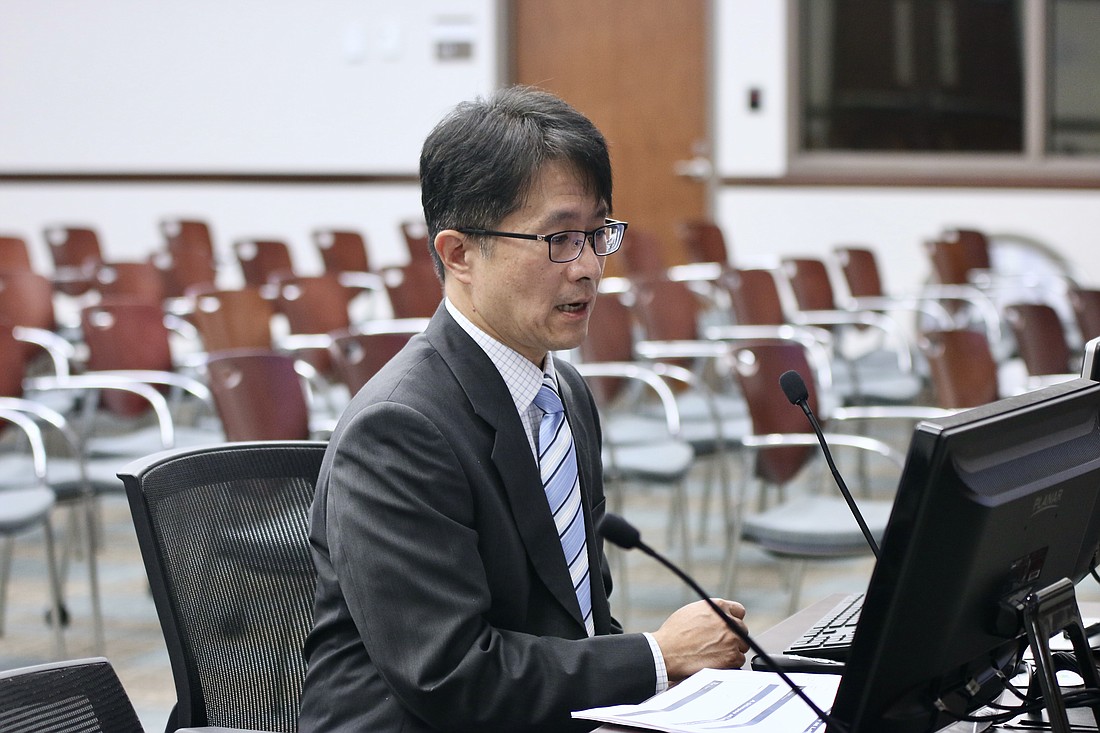- April 23, 2024
-
-
Loading

Loading

According to a University of North Florida economist, the nation could be looking at a minor recession, though Florida could see little to no effect from it.
Chung-Ping Albert Loh is the associate dean for faculty, administration and research at UNF. He has a doctorate in economics and was once again invited to brief the Palm Coast City Council on the region’s economic conditions.
Loh told the City Council at a March 28 meeting that the economy is in a “weird situation,” historically. The United States economy has high inflation rates, he said, to the point that the Federal Reserve Bank has hiked interest rates to combat it. At the same time, the labor market is going strong, he said — people are getting jobs and being paid more.
Because of the odd contrast, Loh said, he conservatively predicts the interest rate hikes will eventually cause a modest or short recession.
Florida, though, is doing better economically than the nation as a whole, Loh said, and might not be as affected as the rest of the country if a recession happens.
“So, here in Palm Coast,” Mayor David Alfin said, “we may suffer more than some, but we will fare better than most.”
“That’s a right assessment,” Loh said.
Inflation
Though increased inflation could still push the U.S. into a minor recession, Loh said, inflation rates have peaked.
“By peaked, I mean the highest rate is behind us,” Loh said. “Now we are trying to bring it down.”
But high rates are likely to continue until they drift back down, he said.
Inflation rates are at an overall 8-10% increase from pre-pandemic levels, Loh said. As of February, food in the U.S. had the highest inflation rate, sitting between 8-10%, while energy — the most likely good to fluctuate — had the lowest, somewhere near 5%, according to Loh’s data.
The Federal Reserve Bank ideally wants to keep inflation at 2%, Loh said. Since rates are still high, the Federal Reserve will likely continue to increase interest rates to combat it, he said.
Employment
Labor force participation has returned to pre-pandemic levels, Loh said.
“The unemployment rate in the nation is at a near-historical low,” he said.
The U.S. has a 2.7% unemployment rate, while Florida has a 2.5% rate, Loh said. Using data from the Deltona-Daytona Beach-Ormond Beach Metropolitan Statical Area, Loh looked at local changes.
Flagler County and Palm Coast are now hovering at around a 3% unemployment rate. The industries that are seeing downturns in employment rates from November to January are goods producing, construction, financial activities, education and health services and leisure and hospitality.
Most of those downturns are seasonal trends, Loh said.
“We don't necessarily have to worry from December through January,” he said. “A drop in employment is typically expected.”
Consumer spending
Consumers are, on average, also feeling optimistic in Florida about the economic situation, Loh said. That is expressed in their continued spending.
Loh's information on consumer and business sentiment comes from a survey called the Jacksonville Economic Monitoring Survey, conducted by UNF.
Vice Mayor Ed Danko asked if people are spending and putting themselves into debt instead of saving. Residents he has spoken with are not feeling optimistic, he said.
They feel overwhelmed by the prices of everything from food to fuel. I don't see much optimism here. — Ed Danko, Palm Coast Vice Mayor
“They feel overwhelmed by the prices of everything from food to fuel,” Danko said. “I don't see much optimism here.”
Loh said that the survey is based on an average, but he also explained that surveys like this are based on how people are feeling.
“They feel good about it, whether it’s realistic or not,” he said.